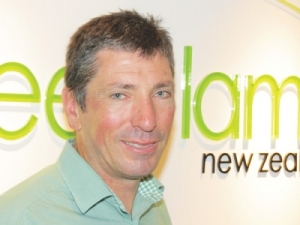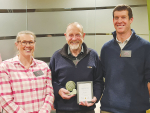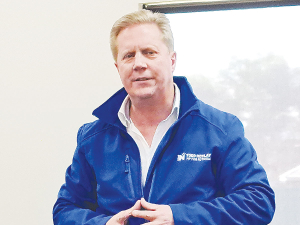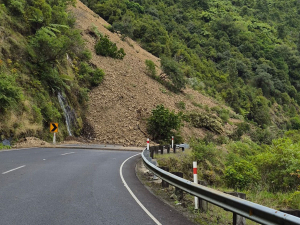This is the fifth year the industry's top performers have gathered to acknowledge outstanding contributors in genetics, science and commercial lamb production.
Amongst the award recipients were Northland sheep breeder Gordon Levet, who was recognised for his long-term work breeding towards worm resistance, while Hawkes Bay farmers James and Jane Hunter won the Blackdale Stud Sheep Industry Supplier of the Year.
Masterton's Derek Daniell received the Farmlands Cooperative Significant Contribution to the New Zealand Sheep Industry award in recognition of the influence his Wairere genetics have had on this country's sheep flock.
Emily Crofoot from Castlepoint Station was presented with a Special Award for Services to the Sheep Industry in recognition of her industry leadership and on-going involvement in extension, innovation and research programmes.
Beef + Lamb NZ chief executive, Sam McIvor says the awards are an opportunity to celebrate the New Zealand sheep industry.
"This country's sheep farmers are acknowledged as being world leading in terms of productivity, animal welfare and the ability to produce a product that meets the demands of today's consumer."
2016 Beef + Lamb New Zealand Sheep Industry Awards winners
Industry Awards
Blackdale Stud Sheep Industry Supplier of the Year – James and Jane Hunter, Waipukurau
The Hunters have been one of the top two Lean Meats suppliers for the last four years. Committing all of their home-bred Romney lambs and the bulk of their trading lambs to contracts allows the couple to supply lambs 12 months of the year on the high-value chilled market. This generates a return well above the industry average. The Hunters have given Lean Meats 12 years of loyal supply.
Focus Genetics Sheep Industry Science Award – Dr Dave Leathwick, AgResearch Grasslands, Palmerston North
There are probably few sheep farmers in New Zealand not using the on-farm practices developed by Dave Leathwick and his team to reduce internal parasite resistance to anthelmintic drenches. In the past eight years, Dave has published 20 peer-reviewed papers on this subject alone. Judges noted he has given vets and farmers a greater understanding of the interaction between sheep and parasites, and effective management strategies. This, in turn, has helped lessen potential productivity losses and control costs.
Primary Wool Co-operative Sheep Industry Innovation Award – Gordon Levet, Kikitangeo Stud, Wellsford
Gordon Levet's grandfather used to regularly lose half of his lamb crop to Barber's Pole worms.
Today, 80% of Gordon's stud Romney rams are undrenched, and Gordon believes it will take another four or five generations of rams before he has a sheep that is totally bullet-proof against blood-sucking internal parasites.Gordon began breeding toward worm resistance in 1987, recognising that there was a genetic component to a sheep's ability to tolerate worms.
Primary ITO Sheep Industry Trainer of the Year – Dan and Tam Jex-Blake, Gisborne
Dan and Tam Jex-Blake believe the rapidly evolving agricultural industry requires a highly-skilled and engaged workforce that consistently deploys technical and practical best practices to achieve strong results on-farm. They see relevant training, personal development and creating a learning culture as an important part of their business – an investment not a cost.To help the career paths of their staff evolve, Dan and Tam provide professional development opportunities. To date, these have been wide-ranging: an internal cadetship programme, Industry Unit Standards, Rabobank Farm Manager Programme, equity opportunity and industry/business seminars.
Ballance Agri-Nutrients Sheep Industry Emerging Talent Award – Will Gibson, Canterbury/Otago
Will Gibson is the Canterbury area manager for the New Zealand Merino Company. Along with managing the Merino Central Progeny Test, he also advises several studs on their use of EID, information systems and the generation of estimated breeding values. Will has a keen interest in Coloured Merino and runs his own stud flock. He also works alongside his parents, Anton and Liz, on improving their ultra-fine white Merino wool and their Suffolk and SufTex breeding flocks. Will has a long involvement in fleece and stock judging. Ultimately, he intends returning to the family farm.
Farmlands Cooperative Significant Contribution to the New Zealand Sheep Industry – Derek Daniell, Masterton
Derek Daniell took over Wairere in 1983, continuing a family tradition spanning 103 years. The family have been breeding Romneys since 1929 and Wairere's medium to steep hill country has proven to be a great testing ground for their genetics. Such a well-established flock has had a significant influence on New Zealand's sheep breeding and productive performance. Ram sales continue to grow as national ewe numbers decline, illustrating the quality and productivity of Wairere stock. The judges noted Derek's holistic view of how his operation fits into the wider New Zealand sheep industry, promoting efficiency and confidence in the future.
Special Award for Services to the Sheep Industry – Emily Crofoot, Wairarapa
Since settling in New Zealand in 1998, American-born Emily Crofoot has immersed herself in a wide range of industry and community-good activities. Along with her husband Anders, Emily has made their farm, Castlepoint Station available as a trial-site for new initiatives and innovations, particularly relating to sheep and beef production. Emily, with her enquiring mind and willingness to challenge the status-quo, has been particularly involved with the governance, planning and execution of many of these trial programmes. She is an active member of several Wairarapa farm discussion groups and, as a top performing farmer, is a highly respected leader within the sheep industry.
Genetic Traits Awards
Alliance Group New Zealand Terminal Worth – SufTex, Mt Linton Station, Dave Warburton, Southland
With its harsh climate and unforgiving topography, the 13,365ha Mt Linton Station in Southland is the ideal environment in which to test sheep genetics.
The breeding operation is focused on producing genetics that survive and thrive in a harsh environment, while still producing a top quality product for the end consumer.The Mount Linton Suftex programme uses proven technology – such as CT scanning, embryo transplant and DNA markers – to improve the flock performance.
Taylor Preston Terminal Trait Leader for Lamb Survival – Texel, Focus Genetics, Peter Strawbridge
Focus Genetics is a company which aims to develop genetically superior sheep for commercial farmers in New Zealand. Scale, science and systems underpin the company's sheep breeding programme which – in recognising that no single breed can deliver everything – incorporates a range of terminal and maternal genetics. Their breeding programme is aimed at producing rams which deliver the greatest overall bottom-line improvement to their clients. The Focus Genetics team work with Waikite Farm Manager Peter Strawbridge and his team in the breeding of the Texel flock.
AbacusBio New Zealand Maternal Worth – MNCC Coopworth, Edward Dinger, Cambridge
Until his recent retirement, Edward Dinger had been breeding Coopworth rams for 41 years. His company, the Mid-North Coopworth Company (MNCC), operated from the aptly-named Ceres Farm – Ceres being the Roman goddess of agriculture and fertility. Edward's stud breeding programme saw some impressive results in achieving high fertility, together with good growth and fleece weights. He recently sold a large part of his flock to Taumarunui-based stud breeder, Ross Richards.
B+LNZ Genetics Maternal Trait Leader for Lamb Survival – Rangiatea Perendale, Blair and Sara Gallagher, Mt Somers
Rangiatea, in the Mid Canterbury foothills, is subject to long winters and regular snowfall. Covering 1160ha, the farm carries 9500 stock units, including 780 recorded Perendales and 90 recorded Cheviots. The Rangiatea stud was first registered in 1971 with the foundation ewes coming from Massey University's Flock 1.The Gallaghers select the best possible genetics to enhance bottom-line profitability in a commercial environment. All sheep are subjected to intense grazing systems, high stocking rates and are bred to perform.











